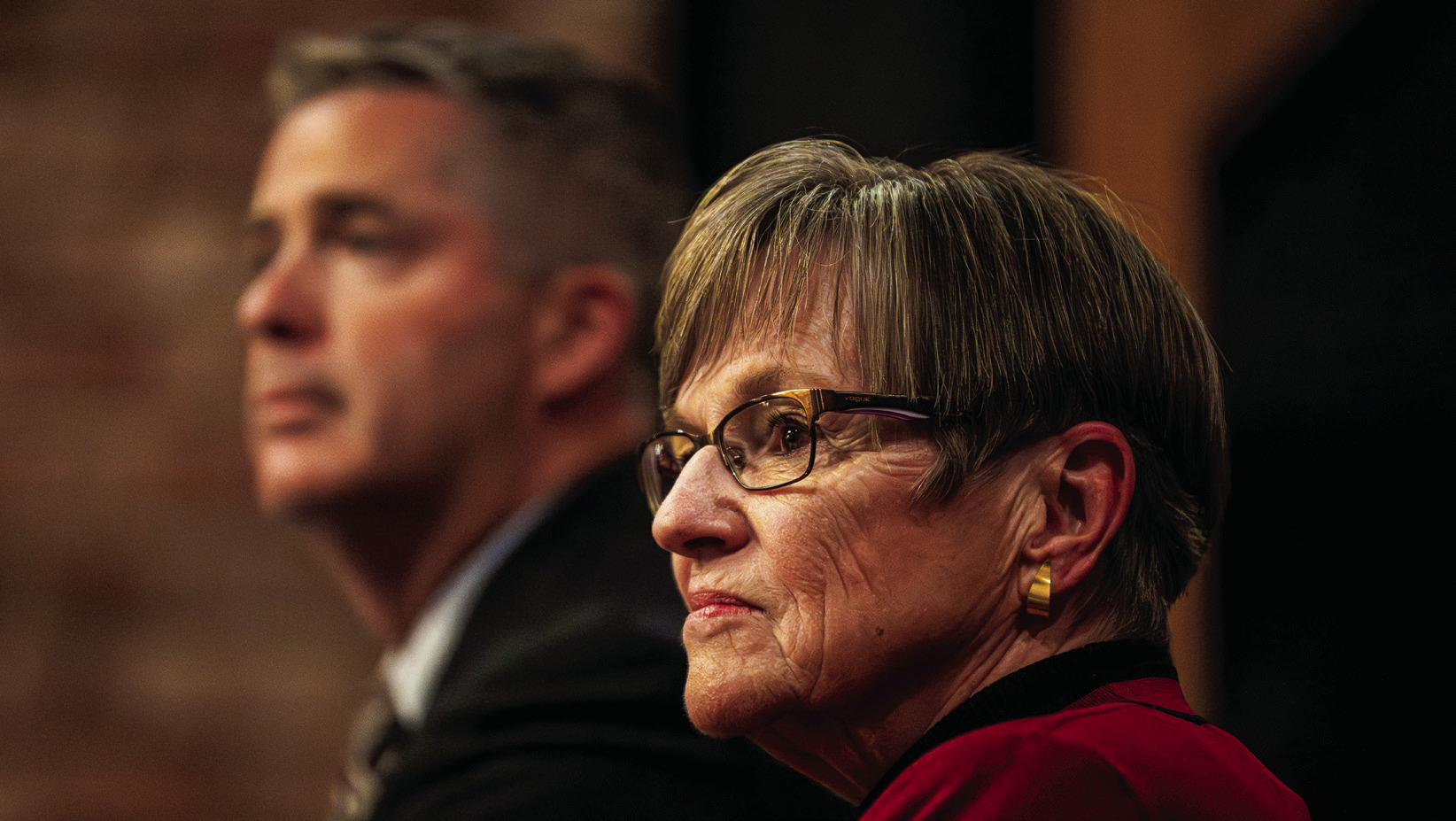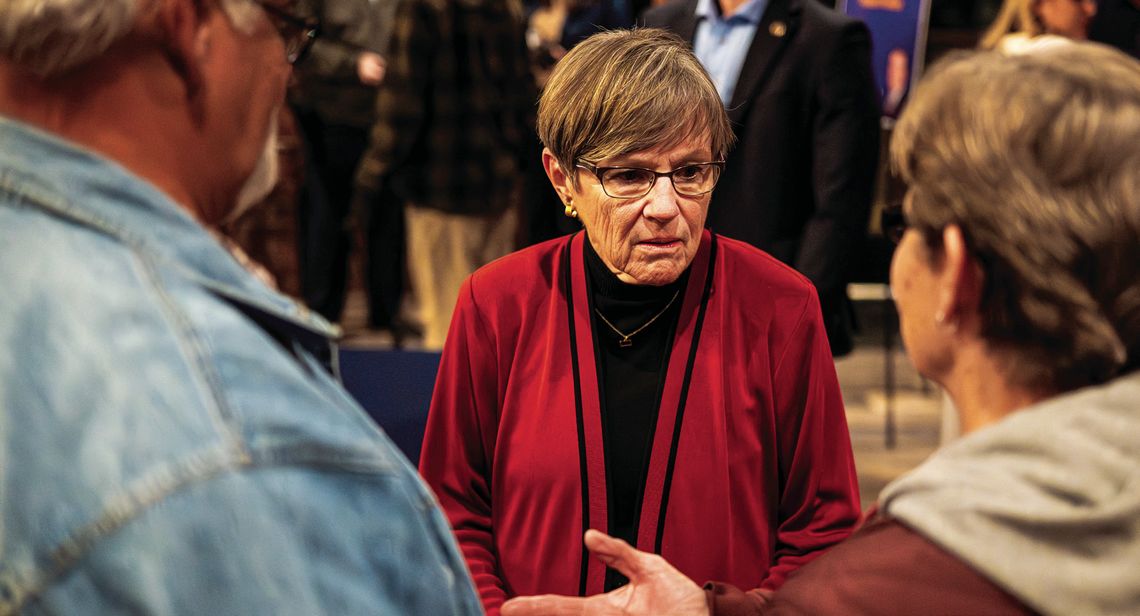PITTSBURG — Residents of Southeast Kansas recently questioned Governor Laura Kelly about budgetary priorities during a recent town hall event in Pittsburg, on Monday, Nov. 10, at the Frisco Event Center.
Kelly was joined on the People’s Budget Tour by Director of the Budget and Secretary of the Kansas Department of Administration Adam Proffitt.
According to the press release announcing the tour, Kelly presents a budget to the Kansas Legislature each year in January. This year, the Kansas Legislature crafted its own budget, which was passed in April.
“The budget passed in April by the Legislature leaves the state facing severe budget shortfalls in the years ahead. The budget created by the state Legislature is projected to have Kansas spend $300 to $700 million more than it receives each year for the foreseeable future, jeopardizing the long-term fiscal health of the state,” the press release states.
Kelly said the purpose of the tour is to hear Kansans’ feedback on how to repair the damage caused by the Legislature’s reckless budget.
Last week’s event also served as a food drive, which benefited a local food pantry.
Kelly and Proffitt began Monday’s event by discussing Kansas’s financial background.
“Many who work with me in Topeka understand that I am absolutely obsessed with the state budget. I believe it is one of, if not the most important, responsibilities that I have as governor,” Kelly said.
She said that when done correctly, a state budget is crafted to ensure that it meets the needs and reflects the values of Kansans, as well as being sustainable over time.
Kelly said that from 2012-2018, Kansas was experiencing a downward economic spiral.
“When I first took office in 2019, Kansas was a fiscal wreck,” Kelly said. “In 2012, then governor, Sam Brownback instituted a tax experiment that would make national headlines and provide fodder for late-night comedy shows. It really wasn’t very funny.”
She said Brownback cut taxes so deeply that the state economy tanked.
“Our revenues plummeted by over $1 billion; our bond rating was downgraded five times; our schools were so underfunded that many went to four-day school weeks; some principals went without pay; and some districts actually collapsed,” Kelly said. “We had to borrow hundreds of millions of dollars from KPERS, our retirement fund. The Department of Transportation was robbed of nearly $2 billion, leaving our roads to crumble and our bridges unsafe.”
According to a report by Michael Mazerov published by the Center on Budget and Policy Priorities, a nonpartisan research and policy institute, the Kansas experiment of the Brownback administration offers compelling evidence that cutting taxes does not improve state economic performance.
These studies include those done by economists from the University of South Carolina, Indiana University, Kansas State University, the U.S. Treasury Department, and the Cato Institute.
“Like the KDOT fund, we were taking money out of other funds and moving it to the general fund to cover basic operating expenditures,” Proffitt said.
One example he gave was the Economic Development Initiative Fund, which had $150 million taken from the fund to cover state operating costs rather than go toward its intended use: economic development. He also noted that during Brownback’s tenure, emergency budget cuts had to be made on three occasions, equating to $400 million worth of funding cuts for healthcare, education.
He said the previous administration skipped $250 million worth of debt payments. Proffitt detailed a pattern of making payments late to schools and creating an “audit nightmare.”
Proffitt then discussed what the state has done differently under Kelly’s leadership to reverse the economic damage.
Proffitt said Kelly worked on stabilizing the budget and restoring fiscal wealth to the state.
“I’m happy to tell you that under the governor’s leadership, we’ve been able to undo every single one of those budget gimmicks over time,” Proffitt said.
Proffitt said this included restoring the state’s credit rating, paying down debts, and paying from appropriate funding sources.
Kelly said currently, the state is able to pay for new capital projects with cash, which saves taxpayer dollars on debt, and that in recent years, there have been record-setting budget surpluses.
“All of that has allowed us then to fund the public schools. We’ve also been able to significantly expand our mental health system to include school-based services,” Kelly said.
Kelly also highlighted a new 100-bed psychiatric center in Wichita; correctional facility changes, which implement workforce training; increased childcare centers; the creation of the Office of Early Childhood; and the Kansas Framework for Growth, the first economic development strategic plan in 35 years, according to Kelly.
This plan had led to $25 billion in new capital investment throughout the state and 78,000 new jobs, according to Kelly.
Kelly said this has been done while cutting taxes by $2 billion, citing the elimination of the state sales tax on food, the
See BUDGET, Page 3.

Governor Laura Kelly was joined by Director of the Budget and Secretary of the Kansas Department of Administration Adam Proffitt on the tour. Sean Frye/Sun Photo
the elimination of state income taxes on social security, and the cutting of other taxes for veterans, homeowners, farmers, ranchers, and business owners.
“Unfortunately, this past session, the legislature passed a budget that threatens the progress that we have made to date. And it is starting to point our state in the wrong direction,” Kelly said.
Proffitt explained that, according to state law, the governor is required to write a budget bill that is then submitted to the legislature for consideration. This is the way it has worked for 60 years, according to Proffitt, starting from the governor’s budget.
“The legislature decided that they would like to create their own budget and really use that to supplant the governor’s budget,” Proffitt said.
He noted that there was a lot of confusion in the budget process and that there was no public testimony provided.
“I would say that the process was woefully inefficient,” Proffitt said Proffit also said he had concerns with the legislature’s budget. He said that the budget was structurally unbalanced, with predicted expenditures exceeding expected revenues by several hundred million dollars per year.
“Also, the last two budget cycles, the legislature has asked us to take on new debt,” Proffitt said. These debts are in the form of bonds. One has been approved, but Proffitt said if a second bond was approved, it would cost the state “well over $100 million of interest costs, just for those bonds, over the next 20 years.”
Proffitt said his last concern was not having the governor’s input on the budget.
“It’s not just this governor, over the budget cycle. Even the next governor — really, every governor — should provide input on the budget process,” Proffitt said.
Proffit noted that the Governor’s budget is informed by nonpartisan agency staff, who are experts in their field.
“If we don’t right our fiscal ship, we will be underwater in just a few years,” Kelly said. “Even though I won’t be the governor then, I still feel an obligation to provide to the legislature, this year, a blueprint and the political will to avoid returning to the dark ages.”
Kelly said Kansas can not afford to forget how failed tax experiments and policies damaged the state economy.
“And this is where I need to hear from you. Given where we are, where do you want us to go? What do you want to see reflected in the people’s budget?” Kelly asked.
Attendees lined up on either side of the event center to ask questions of Kelly and Proffitt.
Attendees asked questions about or requested funding consideration of: local-level taxes, access to mental health services, education funding formulas, disability services, Medicaid expansion, State grants for libraries, services for those with brain injuries, recruitment and retention of public defenders and attorneys, and the retention of the local workforce.
Gov. Kelly is expected to release a 2027 state budget in January. Current and prior year budget reports can be found at https://budget.kansas.gov/budget- report/.




